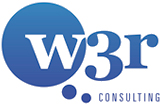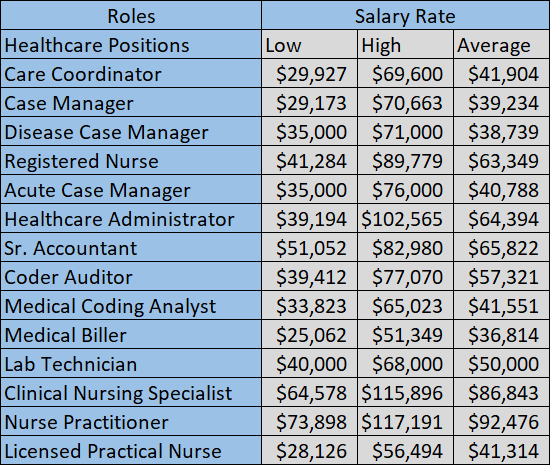w3r Healthcare Salary Guide 2019
How much can the most sought after healthcare professionals earn in 2019? A diverse set of factors affect the answer. Healthcare specializations, current certifications, tech skills, and local demand all contribute to the exact compensation industry experts can expect. Whether you are evaluating new opportunities or extending an offer, your ability to pinpoint accurate compensation will impact your ability to achieve your long-term goals. Rather than weighing all of these ingredients yourself, rely on our expertise to streamline your research into healthcare salaries. Using our 24 years of experience with thousands of healthcare organizations and professionals, we have created the w3r Healthcare Salary Guide 2019. Our team has combined our dynamic knowledge of prevailing industry trends, top paying skills, and successful hiring strategies into a guide that simplifies the decision-making processes. We hope you make full use of our expertise, whether you want to elevate your career or improve your organization’s performance with top talent.
What to Expect from the Healthcare Industry in 2019
As the healthcare industry delves further into the value-based care model, more organizations are turning to cutting-edge technologies and techniques to reduce costs and enhance care outcomes. As a result, 2019 will be marked by exciting new developments that cause healthcare organizations to advance the precision of their services, processes, and operations.
Organizations Will Zoom in On Their Data
Healthcare organizations have come to realize the importance of their comprehensive data, from medical records and local/regional/national healthcare statistics to claims volume and feedback surveys. Rather than strictly reviewing the big picture with big data analytics, more organizations will refine their focus on patient and member data, improving population health management and precision medicine practices. Data management will be crucial if organizations hope to verify that their analysis stems from meaningful and accurate data.
Healthcare Will Transform Through AI
Artificial intelligence will also continue to augment the healthcare industry. Clinical and non-clinical use cases have proven the ability of AI tools to enhance diagnostics, risk assessments, and decision making. The adoption of machine learning is happening so fast that 54% of healthcare pros expect AI to be widespread in the industry by 2023.
Closer Engagement Will Improve Care Outcomes
The growing acceptance of value-based care as a mainstream healthcare model (only 37% of healthcare organizations used a fee-for-service model in 2018) has been a catalyst for more hands-on care practices. Case managers will take on a more central role in proactive medicine and combating the opioid crisis. Additionally, healthcare payors will not only continue to improve their analytics but their ongoing engagement with members to ensure that they improve HEDIS measures and the quality of care outcomes.
The Highest Paying Healthcare Skills on the Market
As the value-based care surpasses the fee-for-service model, more organizations need top professionals who can help reduce costs, increase patient/member satisfaction, and diminish medical errors. However, low unemployment numbers combined with the scarcity of senior business and clinical leaders needed to lead the execution of effective value-based care have elevated compensation across the industry. That said, here are some of the highest paying healthcare skillsets on the U.S. job market.
Nurse Case Management
Opportunities for nursing case managers will expand along with the value-based care initiative, increasing the compensation for this valuable skill. Healthcare professionals who can blend clinical skills with excellent relationship-building can especially make an impact on their patients’ ongoing wellbeing and care outcomes. The right specialization makes the difference: Medicaid Case Management experience ($74,726), CCM certification ($71,500), and Dialysis experience ($71,175) are among the top paying skillsets.
Pharmacy
The pharmaceutical industry is expected to become a $1.17 trillion industry by 2021. According to the Bureau of Labor Statistics, pharmacy jobs are expected to grow by 6%. Though there are opportunities across the board, some of the highest paying positions involve research science such as the Biotechnology Senior Research Scientist ($98,527) and Research Scientist ($82,452).
Nursing
As the front lines of value-based care, nurses are in high demand across the healthcare industry. In fact, nursing job opportunities are expected to grow by 15% by 2026. This year, nurses who are trained as Nurse Anesthesiologists, Nurse Practitioners, and Certified Nurse Midwives will earn the most.
The Trick to Attract Top Talent
Organizations that comprehend the latest trends in healthcare compensation have a primary puzzle piece in place. However, they need to approach hiring from an informed perspective if they hope to solve their remaining hiring challenges. Talent shortages, low national unemployment, and an uptick in demand for top healthcare skillsets are forcing organizations to reevaluate their established tactics and adapt to keep up with the pack. Here are the strategies leading organizations now use to overcome the talent gap.
Make Your Talent Pipeline a Priority
Old hiring mindsets need to be the first adjustment. In a talent scarcity market, healthcare organizations need to prepare well in advance of their workforce needs or risk long sourcing processes – most healthcare roles remain open for 22.9 days or more. Organizations that are proactively talent pipelining are able to reduce that timeframe substantially. Recruiting passive candidates, people who are not searching for opportunities but are receptive to those that fit their goals, yields higher quality candidates. By forging new connections, discovering what motivates professionals, and marketing the differentiators of their business, healthcare organizations can stand out to their target candidates. Keeping up those relationships can ensure that qualified people are available when you need to scale your workforce. 
Identifying When You Can Train Promising People
In the healthcare industry, there can be less wiggle room when it comes to job requirements as many disciplines demand strict certifications and specializations. However, organizations that remain flexible with less mandatory experiences can overcome hiring barriers by choosing promising talent rather than a rigid criteria. One example is with nurse case manager positions. Identifying and hiring professionals who want to provide end-to-end care, love to educate people, and pursue a genuine involvement in their patients’ lives can match case management experience. Additionally, hiring people who are capable of learning on the job can bypass experience with specific technology or practices. Finally, providing professionals with opportunities to learn lowers attrition rates and encourages engagement across your workforce.
Outsource Your Talent Search
Like many healthcare leaders, a wealth of other obligations divert your attention away from the full amount of time needed to cultivate an efficient pipeline. Fortunately, outsourcing aspects of the hiring process in a smart way can yield equal (if not better) results. For example, creating a referral program like ours can tap into your employees’ networks, yielding dependable people with an attractive referral bonus. Another strategy is to partner with the right staffing firm, leveraging their best-in-class strategies to locate, review, and hire talented people who can elevate the performance and care outcomes of your organization.
About w3r
w3r Consulting is an award-winning leader of talent solutions, data management and analytics, and enterprise consulting services. w3r empowers companies to achieve their full potential by emphasizing accountability, innovation, and integrity in all of their data-driven solutions. Clients trust w3r’s expertise to elevate their stature and deliverability above the competition in competitive global marketplaces that evolve in an instant.


